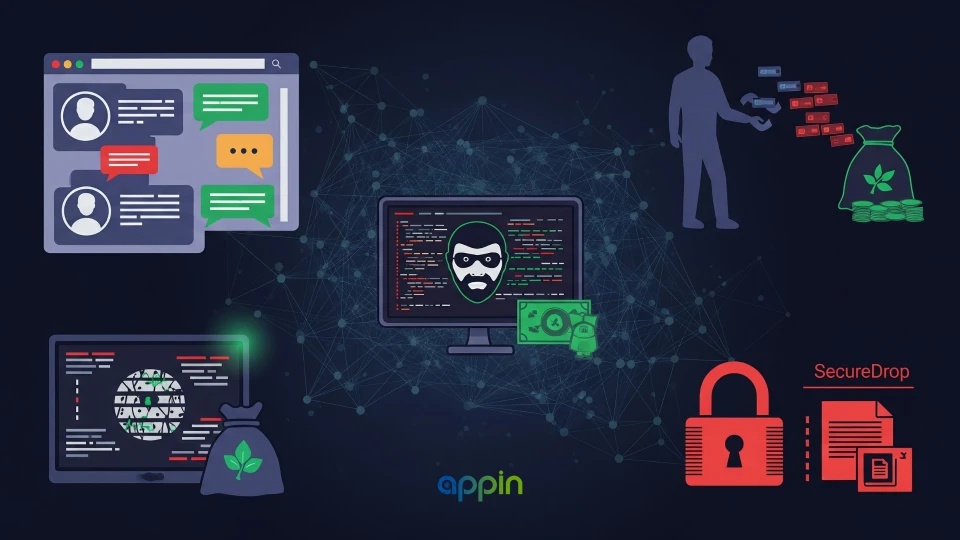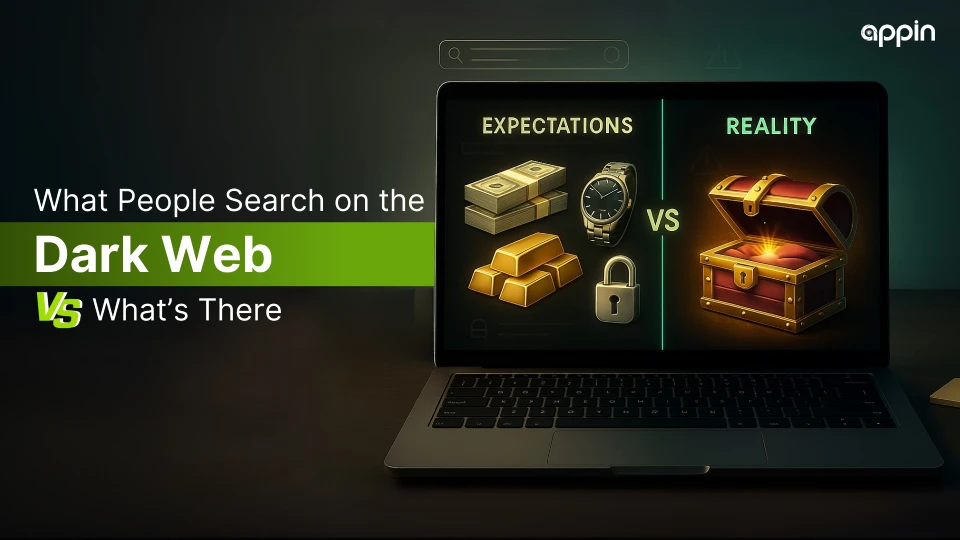What Do People Think Is on the Dark Web?
Most people believe the dark web is full of hackers, illegal markets, and hidden criminal activity. The myths about the dark web are often more extreme than reality. Popular rumors suggest you can buy human organs, hire hitmen, or access secret government files with a few clicks. Movies, sensational news stories, and online forums fuel these dark web rumors, making it seem like an endless criminal marketplace.
In truth, these exaggerated stories mislead beginners who are curious about what people search on the dark web. While there are illegal markets, the majority of myths spread because of fear and mystery.
The takeaway is that students and young professionals must separate dark web myths from reality before jumping to conclusions. Understanding this difference is the first step in approaching cybersecurity with a clear, informed mindset.
What Is Actually on the Dark Web?
The dark web hosts a mix of legal and illegal content, but most of it is not as dramatic as people imagine.
When people talk about what’s really on the dark web, they are often surprised that it is not filled with movie-style criminal networks. Instead, the dark web has communities, forums, and services that range from useful to harmful.
Here are examples of what you will actually find:
- Privacy and free speech forums: In countries with censorship, citizens use the dark web to share opinions safely.
- Black markets: Yes, there are marketplaces selling stolen data, drugs, and counterfeit items.
- Hacking communities: Forums where users discuss tools, exploits, and underground services.
- Whistleblower platforms: SecureDrop and similar tools allow people to share sensitive information safely.
- Dark web websites 2025: Many are simple forums or blogs, not the fantasy-driven places often imagined.
It is important to note that while not everything on the dark web is illegal, the risk of scams and malware is high. Some sites pretend to offer one service but trick users into giving away personal data.
For students, the reality check is simple: while there are illegal corners, the dark web also has spaces designed for privacy and free speech. Recognizing what’s really on the dark web helps you avoid falling for myths or unnecessary fear.

What Do People Really Search on the Dark Web?
Most searches revolve around data leaks, stolen accounts, and illegal goods, not the wild myths people imagine.
When analyzing common dark web searches, the pattern shows that users are often looking for stolen personal or financial data. One of the most popular categories is credit card data, which is sold in bulk. Another common search is for hacked Netflix or gaming accounts, which are cheap and easy to resell.
Other frequent searches include:
- Fake IDs and passports used for fraud.
- Malware and hacking tools that appeal to criminals and beginners experimenting with cyberattacks.
- Stolen data dark web markets offering email lists, login credentials, or leaked databases.
The difference between perception and reality is clear. While movies make it look like people search for secret files or assassination services, the reality is mostly digital theft and fraud.
For students exploring cybersecurity, knowing what people search on the dark web is valuable because it shows the type of threats professionals must defend against. Understanding stolen data, account breaches, and malware distribution can help ethical hackers prepare for real-world security challenges.
This is where structured training like Certified Ethical Hacking becomes important, as it teaches how to recognize and prevent the same attacks that drive most activity on the dark web.
Why Is the Dark Web Risky for Beginners?
Visiting the dark web without knowledge is risky because of scams, malware, and legal consequences.
One of the biggest dangers is phishing, where fake websites trick users into entering their personal information. These sites are common in risks of using the dark web, and many beginners cannot tell them apart from legitimate ones. Spyware and malware are also hidden in free downloads, often disguised as hacking tools or leaked databases.
Another issue is scams. Many sellers advertise stolen data or illegal goods, but they disappear once they receive payment. Beginners often lose money because they do not know how these scams work.
There is also the danger of law enforcement traps. While accessing the dark web itself is not illegal, many activities there are monitored. Students who enter without protection may expose their identity, making them easy targets.
In short, the dangers of the dark web come from a mix of scams, infections, and legal risk. For beginners, the safest approach is to learn about these risks in a classroom or lab environment instead of experimenting blindly.
Is Accessing the Dark Web Legal in India?
Accessing the dark web is not illegal, but using it for crime or buying illegal goods is against Indian IT laws.
The key distinction is that tools like Tor, which allow dark web access, are legal in India. People use them for privacy, bypassing censorship, or anonymous communication. However, once someone uses the dark web for activities such as buying drugs, stolen data, or fake documents, they are breaking the law.
Dark web laws in India fall under the Information Technology Act, which prohibits unauthorized access, data theft, and online fraud. Penalties can include heavy fines and prison sentences.
This means students should understand the difference between exploring technology and engaging in cybercrime. It is possible to study the dark web legally through controlled labs, research projects, or ethical hacking training.
So, while is the dark web legal in India is a common question, the answer is simple: access itself is fine, but criminal activity is not. Staying informed about the law protects beginners from accidental mistakes.
What Is the Ethical Way to Learn About the Dark Web?
The right way to learn is through ethical hacking courses, labs, and simulations, not by browsing illegally.
Many students are curious about learn about the dark web legally, but jumping in directly is unsafe. Instead, structured programs provide controlled environments where learners can understand how cyberattacks happen without risk.
At Appin, students can explore ethical options such as:
- Cyber Security Certification – Basics of internet safety, accounts, and networks.
- C|EH v13 Ethical Hacker Course – Teaches penetration testing and simulates real attacks.
- Bug Bounty Diploma – Hands-on program for finding vulnerabilities in legal, authorized platforms.
These courses prepare students for careers in cybersecurity while avoiding the ethical hacking vs dark web trap. Instead of experimenting illegally, students learn to protect systems, analyze threats, and build professional credibility.
For beginners, ethical learning is the safest way to explore the same tools and techniques without risking their future.
What Should Students Remember About the Dark Web?
The dark web is real, but it is less mysterious than myths suggest, and it carries serious risks.
Students should remember three points:
- Myths are often exaggerated compared to reality.
- What people search on the dark web is usually stolen data, accounts, or tools, not movie-style secrets.
- Risks include scams, malware, and legal consequences.
The safe choice is to study cybersecurity through structured, legal programs instead of experimenting online.
Enquire now with Appin to start learning cybersecurity the ethical way.


